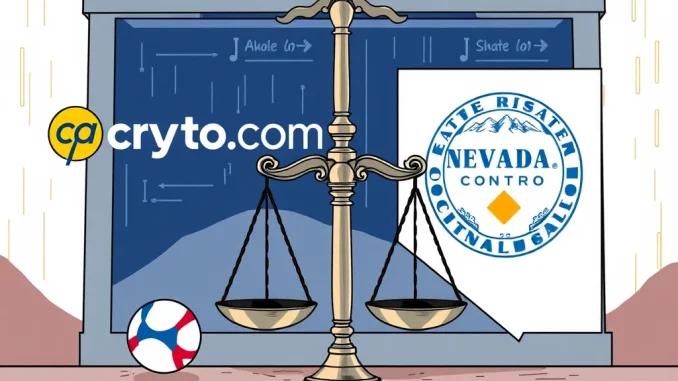
Breaking news from the intersection of crypto and regulation: A significant Crypto.com lawsuit has just been filed. The derivatives arm of the major crypto exchange, Crypto.com, is taking legal action against the Nevada Gaming Control Board (NGCB). This move highlights the ongoing tensions between state regulators and federal authority in the rapidly evolving world of digital assets and financial products.
What Triggered the Crypto.com Lawsuit?
At the heart of the dispute are restrictions placed by the Nevada Gaming Control Board on Crypto.com’s ability to offer trading in sports event contracts. Crypto.com argues that the NGCB is overstepping its bounds by interfering with these specific types of derivatives trading.
Think of sports event contracts as a way to trade on the predicted outcome of a sports event, but structured as a financial derivative rather than traditional sports betting. These products fall under the purview of federal commodities law, according to Crypto.com.
Why Does CFTC Jurisdiction Matter Here?
Crypto.com’s core argument rests on the principle of federal preemption. They contend that under the U.S. federal law known as the Commodity Exchange Act, the Commodity Futures Trading Commission (CFTC) holds exclusive regulatory authority over commodity derivatives, including these types of event contracts. If a product is properly regulated by the CFTC, state bodies like the Nevada Gaming Control Board should not have the power to restrict or prohibit its trading.
This legal challenge isn’t happening in a vacuum. It follows important precedents set by previous cases.
Learning from the Kalshi Lawsuit Precedent
This isn’t the first time state gaming regulators have clashed with platforms offering event contracts. The predictions marketplace Kalshi faced similar legal battles in both Nevada and New Jersey. In those instances, courts ruled that state gaming regulators did not possess the authority to oversee event contracts that had received federal approval and were under the regulatory umbrella of the CFTC.
The outcomes of the Kalshi lawsuit cases provide a strong legal foundation for Crypto.com’s current challenge. These rulings reinforced the idea that when the CFTC has jurisdiction, state regulators generally do not.
Here’s a simplified view of the regulatory clash:
| Entity | Claimed Authority | Basis |
|---|---|---|
| Crypto.com (Derivatives) | Federal (CFTC) Exclusive Jurisdiction | Commodity Exchange Act; Products are federally regulated derivatives |
| Nevada Gaming Control Board | State Gaming Regulation | State laws related to gambling/wagering; Products resemble sports betting |
| CFTC | Federal Regulation of Commodity Derivatives | Commodity Exchange Act; Authority over futures, options, swaps, and certain event contracts |
What Does This Mean for Sports Event Derivatives and Crypto Regulation?
The Crypto.com lawsuit has significant implications for the trading of sports event derivatives and the broader landscape of crypto regulation in the United States. It highlights the ongoing struggle for clarity over which regulatory body has authority over novel financial products that touch upon both traditional finance and the digital asset space.
- Clarity Needed: The case underscores the urgent need for clear federal guidelines on how crypto-related derivatives and event contracts should be regulated across the U.S.
- State vs. Federal Power: It’s another example of state regulators attempting to apply existing laws (like gaming laws) to new technologies, often conflicting with federal frameworks.
- Market Access: The outcome could impact the availability of certain trading products for users in Nevada and potentially set precedents for other states.
Platforms offering sports event derivatives and similar products face the challenge of navigating this complex and often conflicting regulatory environment.
Challenges Ahead
For Crypto.com, the challenge is proving that their specific sports event contracts are indeed federally regulated commodities under the CFTC and not subject to state gaming laws. For the Nevada Gaming Control Board, the challenge is defending its interpretation of state law and its relevance to these modern financial instruments, despite the Kalshi precedent.
This legal battle is likely to be watched closely by other crypto platforms, regulators, and market participants.
In Summary: A Key Regulatory Showdown
The Crypto.com lawsuit against the Nevada Gaming Control Board is a pivotal moment in the ongoing debate over crypto and derivatives regulation in the U.S. By asserting that CFTC jurisdiction over sports event derivatives preempts state authority, Crypto.com is leveraging the precedent set by the Kalshi lawsuit cases. The outcome of this legal battle will be crucial in defining the boundaries of state and federal power and providing much-needed clarity for the future of innovative financial products in the digital age.



